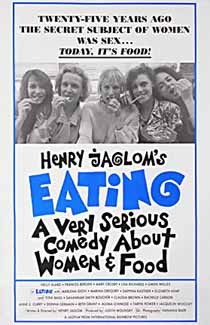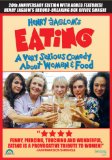| Reviews & Columns |
|
Reviews DVD TV on DVD Blu-ray 4K UHD International DVDs In Theaters Reviews by Studio Video Games Features Collector Series DVDs Easter Egg Database Interviews DVD Talk Radio Feature Articles Columns Anime Talk DVD Savant Horror DVDs The M.O.D. Squad Art House HD Talk Silent DVD
|
DVD Talk Forum |
|
|
| Resources |
|
DVD Price Search Customer Service #'s RCE Info Links |
|
Columns
|
|
|
Eating - 20th Anniversary Edition
These kinds of pressures as well as broader, societal demands are the subject of writer-director Henry Jaglom's Eating (1991), "a very serious comedy about women & food," so says the poster. Twenty years ago it took audiences by surprise, finding a much wider, more mainstream audience than the usual Jaglom film, chiefly because it was so open and honest about a subject normally locked away in the closet, and one that many men weren't even aware of at all.
Today, topics like binging and purging are, thankfully, more familiar and less stigmatizing than they were in 1991, but the film continues to impress all these years later. The immediacy and intimacy of the performances hasn't dimmed and the sheer variety of personal stories invariably makes connections between female viewers and the actresses onscreen. Indeed, after the movie was over the first thing the woman I watched this with said was, "For every woman, somewhere in that film is her story."
First released in 2004 in full-frame format, this 20th Anniversary Edition is in 16:9 enhanced widescreen and comes with a more satisfying assortment of extra features, including a fascinatingly awkward appearance by the cast and director on The Phil Donahue Show.
While Helene (Lisa Blake Richards) anxiously awaits her husband's return from a business trip, she reluctantly hosts a joint birthday party at her spacious Southern California home. She and her friends are hitting milestones: she's turning 40 while talent agent and mother Sadie (Marlena Giovi) is turning 50 and happily married Kate (Mary Crosby) turns 30. Meanwhile, exotically beautiful houseguest Martine (Nelly Alard), in Los Angeles to shoot a documentary for French television, takes advantage of the dozens of women (and no men) at the party by asking them on-camera about their attitudes toward food and eating. Elsewhere, Helene's gossipy, self-destructive busybody best friend, Sophie (Gwen Welles), suggests Helene's husband may be having an affair.
Jaglom conceived the film's structure and plot, but all of the discussions and confessions by the women about their relationship with food came from the actresses themselves, drawing upon their own feelings and personal experiences. What they say is alternately sad, funny, shocking, and insightful. Those who dismiss the film as indulgent group therapy should watch it with an audience full of women. If ever there was a film to get people talking afterwards, this is it.
Some have criticized Eating on the grounds that nearly all the women in the movie are moderately attractive-to-gorgeous (by 1991 western-world standards anyway), that none could accurately be described as obese, and therefore that a 350-lb. woman watching the movie might reasonably be offended by the ridiculousness of all these beautiful women complaining about how fat and ugly they think they are.
Jaglom would argue that's just the point: here are women whom most would describe as attractive, even glamorous, and yet even they have crippling issues with eating that prevent them from enjoying food as Helene's bemused mother (Frances Bergen, Edgar's widow) always did. Also, Jaglom reasonably argues that he's writing about the environment in which he's most familiar (i.e., Southern California and women connected to the entertainment industry) and, besides, Los Angeles is more image-conscious, body-obsessed than practically any place on earth.
As with The Women (1939), there are no men in the cast, and there are more women in the crew than the usual indie feature. Partly this is because, Jaglom says, the issues these women grapple with don't apply to men. I disagree, arguing that several generations of men younger than Jaglom - perhaps a side effect of America's early postwar prosperity? - struggle with many of the same issues, while admittedly that some of the causes and effects are gender-specific.
Eating has its share of laughs. A very funny, perceptive scene involves the cutting of the birthday cake: the first piece is passed among all the women, ending up back where it started because no one dared dive into that first piece of delicious cake. Funny and sad montages of women talking about food while looking straight into Martine's (and Jaglom's) camera are intercut with splashes of acerbic wit. Says one: "I'm still looking for a man who can excite me as much as a baked potato."
Video & Audio
Eating is presented in its original 1.85:1 theatrical release format in 16:9 enhanced widescreen, in a clean and clear transfer. The region 1 encoded disc offers adequate monophonic audio (English only) but no subtitle options or closed-captioning.
Extra Features.
Jaglom himself talks about the film's production and the issues it presents in an apparently recycled audio commentary from the 2004 DVD release. Much of what he says is extremely interesting, my only complaint being that there are long pauses while he (frequently) encourages the viewer to "listen in" on a particular onscreen conversation. While that makes the experience more interactive, I suppose, most will watch the movie start-to-finish and then listen to the commentary, and therefore would probably rather listen to Jaglom than simply re-watch scenes they just saw.
The real find is a complete episode of The Phil Donahue Show from 1991, featuring Jaglom and most of the main cast. Jaglom wants to have a serious discussion but Donahue and the demands of the talk-show format unintentionally do everything to derail and trivialize it. Fortunately, things get back on track after the actress with that baked potato line speaks from the heart and the discussion becomes serious again.
Also included are trailers (in 4:3 and 16:9 formats) for nearly all of Jaglom's movies and EPK ("electronic press kit") clips from the film.
Parting Thoughts
Watching Eating again for the second time in twenty years, I couldn't help but wonder how many lives it may have saved, if for no other reason than by providing some comfort for desperate women: the knowledge that they are not alone.
Stuart Galbraith IV's latest audio commentary, for AnimEigo's Musashi Miyamoto DVD boxed set, is on sale now.
|
| Popular Reviews |
| Sponsored Links |
|
|
| Sponsored Links |
|
|
| Release List | Reviews | Shop | Newsletter | Forum | DVD Giveaways | Blu-Ray | Advertise |
|
Copyright 2024 DVDTalk.com All Rights Reserved. Legal Info, Privacy Policy, Terms of Use,
Manage Preferences,
Your Privacy Choices | |||||||














